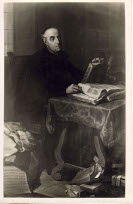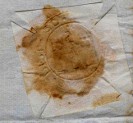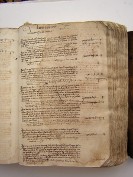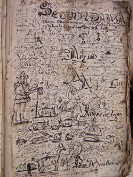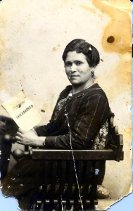Municipal archive
History of the producer
The town of Pego was born after the Christian conquest of the thirteenth century and with the granting of two letters of settlement: 1279 and 1286. After its royal origin it was part of the heritage of several noble families until 1479 bought Mrs. Francesc Gilabert de Centelles, Count of Oliva. In 1595 the town became part of the heritage of the Borja, Dukes of Gandia. After the War of Succession the Council was renamed City Council under Spanish legislation. During the 19th century, Pego was the head of the Judicial District with the First Instance Court.
Archival history
The historical archive is undoubtedly the identity card of any town or city, and its importance is to rebuild the historical past through the documents that are kept in it. The Historical Archive of Pego collects the documentation produced over time by the municipality, as well as other institutions such as the Church, as well as private donations or acquisitions of other archives.
The first tasks on sorting and classification in the Pego archive began at the beginning of the 20th century by vicar Bernardino Sastre Ferrando. Later, Carmel Giner Bolufer was the one who, in addition to investigating the history of Pego, invented the fund there in 1947. Since it made bindings and classifications, Evarist Caselles had to respect it to make the inventory published. In 1986, with a classification table that was not structured nor adapted to new archival techniques, however, valid for documentary research.
The archive fund includes the data limits of 1488-1950. The most important documentation that counts is: the complete series of Council or City Council Acts since 1555, only interrupted by some chronological losses; the books of Justice and the cloaks or books from the fifteenth to the nineteenth century.
It seems that the operation of the archive had to start from the fifteenth century, but with little conserved documentation. In the sixteenth century we have found a lot of conserved documentation, and at the same time direct references to the existence of a Hall Archive. With the War of Succession, it seems that only the towers that surrounded the city were damaged, not suffering from the file too many difficulties.
The mid-nineteenth century began the works of the new City Hall, and the archive was transferred to a particular house. During the Civil War, the archive was not altered due to the prudence of what was then the mayor, the socialist Aquilino Barrachina, who covered the access door that remained under the table of his office. With the work of the current City Council, much of the archive was transferred to the offices of the former Savings Bank of the Southeast of Spain, just where the future work of the new archive falls.
After the war, the archive was in the hands of Carmel Giner, who invented it in 1947. The last municipal archivist was Evarist Caselles, who ordered and organized the archive with better conservation and consultation conditions.
After being the archive for many years in a small and distressed dependency on the town hall, he is currently located in his new warehouse, at the Casa de Cultura.
Open the historical archive (1488-1980) for the consultation since 2004, numerous restoration and conservation activities have been carried out as well as the incorporation of other sources. It is worth highlighting the restoration of the first councils and other accounting books of the 16th century. The funds of the Pego Property Registry (1760-1980) and the Pego Notary Registry (1700-1900) have been incorporated.
The cultural extension is one of the highest intentions and from the archive there are specialized publications, conferences and talks, guided tours and exhibitions; And since 2004, the “Carmel Giner Bolufer” Studies Conference of Pego and the valleys have been celebrated biannually.
The Municipal Archive of Pego collects the documentation produced and generated over time by the municipality of Pego, as well as by other diverse documents that are incorporated by donations or acquisitions, with the guarantee of conservation, organization and service to the public. It works as an internal and external information center and for the historical investigation of Pego open to researchers and also to the general public.
The archive fund forms, therefore, all the documentation from the activity of the council and then Pego City Council, from the mid-15th century to the present day.
Conditions of access
Free, upon request and control of the user’s data. We differentiate between the users of the municipal administration and the general public. For digital document queries, digital copies are taken into account for originals for reasons of conservation.
Terms of reproduction
You will be able to obtain a copy of those documents of unrestricted access. In case of public use of reproductions of documents, it must be stated obligatorily its origin. In the absence of a regulatory ordinance the archivist reserves the right to decide on the restricted use or not of the documentation, always facilitating the access of the citizen to the information.
Services
- Reproduction of photocopies.
- Computers with Cd-rom service.
- Consultation room.
- Attention to the public: documentary and legislative searches, advice on research and education.
- Check via email.
- Auxiliary library. - Conference and exhibition hall.
Description tools
GINER BOLUFER, C. (1947) General Inventory of the Archive of Pego, Manuscript, 83 p.
CASELLES MONJO, E. (1986) General inventory of the municipal archive of Pego. Update of the inventory carried out in 1947 by En Carmel Giner Bolufer. Quaderns Pego, Monograph, 1. Valencia.
Other funds included in the Municipal Historical Archive not created by this institution are worthy of mention:
PRIVATE FUNDS
Personal documents Carmel Giner Bolufer (1920-1974)
Personal documents and private library of José Vidal Bernabeu (1922-2006)
COLLECTIONS
Municipal Photographic Archive (19th-20th century) From private donations and the incorporation of the photographic background of Francisco Maestre and Vicente Gilabert.
Colección de libros de Fiestas de Pego (1942-2010)
TYPE OF CLASSIFICATION OF THE MUNICIPAL ARCHIVE OF PEGO
For the first and second sections (1488-1932)
GROUPS:
FIRST: Patterns of rustic and urban wealth:
- Books of goods or capitals: 1488-1812.
- Amillaramento Books: 1814-1923.
- Landmark of buildings and lots: 1859-1920.
- Appointment Padrón de la Equivalente: 1711-1870.
- Contribution Scoreboard: 1870-1932.
- Industrial Registration: 1826-1942.
SECOND: Book relations and governance ligands. Council acts: 1555-1932.
THIRD: Municipal justice and some notarial protocols. Books of Justice: 1567-1911.
QUART: General Accounting: 1541-1932.
QUINT: Patrons of inhabitants, censuses … 1813-1927.
SEXT: Elections: 1838-1933.
SETÉ: Books of Quinta and related to the Army: 1749-1932.
VOICE: Various files, correspondence: 1712-1931.
Joan Miquel Almela
- Municipal archivist *
| Location: | Street Sant Domènec, 5 Pego (Alicante) |
| Telephone: | 96 557 28 01 |
| E-mail: | arxiumunicipal@pego.org |
- Winter Hours: Monday to Friday from 08:00 a.m. to 2:00 p.m. and from Monday to Wednesday from 5:00 p.m. to 8:00 p.m.
- Summer opening hours (July and August): from Monday to Friday from 08:00 to 2:00 p.m.







